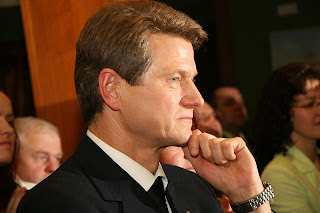Rolandas Paksas: tainted by his presidency.
Rolandas Paksas was a member of the Communist Party - which, to be fair, was the only legal political party for a considerable part of his career - and its post-Soviet successor, the Democratic Labour Party, before joining the centre-right free-market Homeland Union. He then joined the Liberal Union of Lithuania, and then founded the Liberal Democratic Party. He holds a seat for the Liberal Democrats - or Order and Justice as they call themselves - now, although it is now as an MEP, rather than as a member of the Lithuanian legislature.
His party, Order and Justice (TT), were one of the most successful anti-establishment parties. Combining liberal conservatism, national conservatism, Euroscepticism, and, to some extend, classic liberalism, the party was the very definition of populism: it achieved a major electoral success less than one year after its foundation. The leader's experience as the former president of his own construction company and a distinguished aerobatics champion back in Soviet days - not to mention Prime Minister of the country - won over the Lithuanian people. Rolandas Paksas took the presidency after a run-off with Valdas Adamkus.
So, what, then, could possibly be holding the Eurosceptics in Lithuania back? Their leader is more eminently qualified than any other in Europe; he perhaps has a better CV than most heads of state. He has served in both of the senior positions in his country, has economics experience, is a former sportsman, and appeals to every faction of the Lithuanian political spectrum. Eurosceptics here seem to have it made. Their popularity is also rising steadily, as it is in other European countries; so what could be wrong?
The answer, unfortunately, is that their successes and their failures are inextricably linked. Rolandas may have been President, something which should, ideally, give him a massive electoral advantage over all of his opponents. It is certainly something that no other Eurosceptic and few other party leaders can boast. However, it is precisely because he was president that he faces his biggest disadvantage now.
This isn't on the orders of the European Union or some strikingly illiberal figure within the Lithuanian parliament: this is owing to his own actions in 2004, less than one year after he took power. He he was found to have rewarded a major political ally - an aviation tycoon who had poured four hundred thousand pounds into Mr. Paksas's campaign - with Lithuanian citizenship. He was forced from office, and put on trial: he remains the only European head of state ever to have been impeached. One of the terms of that impeachment was his banning from the Seimas: another was him being forbidden from running for the presidency for five years.
In January of this year, the European Court of Human Rights (which has nothing to do with the European Union) ruled that the lifetime ban on him running for parliament was contrary to the European Convention on Human Rights, but the stench of the impeachment still lingers over the aerobatics champion. And, for as long as that stench lingers, Lithuanian Euroscepticism will have its wings clipped.

No comments:
Post a Comment